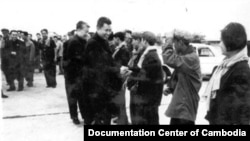Part Two: Assessment on Arrival
In 2007, John Gunther Dean, the last US ambassador to Cambodia before it fell to the Khmer communists, turned over thousands of documents to the Jimmy Carter Library in Atlanta, Georgia, part of the US National Archives. The documents show a man repeatedly trying to settle the civil war, while his views put him at odds with then Secretary of State Henry Kissinger. But years later, Dean still insists a controlled solution could have worked, preventing a brutal close to Cambodia’s civil war. This is the second in a series of reports on the Dean documents, being reissued by VOA Khmer for the 40th anniversary of the fall of Phnom Penh, in April 1975.
John Gunther Dean flew from his confirmation as ambassador to Phnom Penh on March 31, 1974. By then, President Nixon was on his way out of office, having concluded the Vietnam War and admitted to a secret Cambodian operation that some historians say fueled a national communist insurgency. The Khmer communists by 1974 were an independent, organized fighting force with a developing dogma and already brutal policies. And they were closing in, encircling Phnom Penh, the last stronghold of the faltering Khmer Republic.
Two weeks before Dean’s arrival, the communists took a key position north of Phnom Penh, Oudong, an old capital of the Khmer empire. The communists held Oudong despite an offensive by the Khmer Republic’s national army several days before Dean touched down. The ambassador presented his credentials to a stroke-afflicted President Lon Nol in a military camp that, the ambassador thought, “looked like a Foreign Legion outpost, with barbed wire and fencing all around it.”
Straight from a posting in Laos, Dean immediately began an assessment of the Republic’s military situation. Almost simultaneously, he began to look for ways to engage the communists in negotiation.
The Khmer communists had failed to gain Phnom Penh in their 1974 dry-season attacks, Dean wrote, but ended the campaign with a net gain in population and territory. The Khmer communists, or KC, were able to refill their combat units faster than the Khmer National Armed Forces, or FANK, and had shifted to a “provincial strategy,” giving them an advantage in mobility. They had made “notable progress” improving their firepower, “particularly as regards the number and accuracy of 105 mm howitzers.”
Meanwhile, the national navy had been able to keep the Mekong open from Phnom Penh to Kampong Cham.
“Morale on both sides’ ground forces is poor, but the KC’s tight discipline is a compensating factor the FANK does not have,” Dean wrote. “Neither side should therefore be capable of shifting the war dramatically in its favor during the remainder of this dry and the coming wet season unless economic and political factors intervene.”
Dean cautioned that the Khmer Republic would not last much longer. The government had a “better than even chance of surviving into the next calendar year,” he wrote, but after that the odds were against it. “We recommend a [US government] initiative towards negotiations during the next five months, well before the next United Nations General Assembly.”
Not long after Dean’s initial assessment, the ambassador began suggesting negotiations, says historian Kenton Clymer, author of the soon-to-be-released “Troubled Relations: The United States and Cambodia since 1870.”
“He talked about trying to negotiate a controlled solution, as he called it, as early as the summer of 1974,” Clymer said in a recent interview.
Dean had assumed that because he’d helped bring an end to fighting in Laos, where he was charge d’affairs at the US mission, he had been sent to do the same thing in Phnom Penh. But he began to learn otherwise, Clymer says.
“He certainly came to the conclusion quite quickly that he wasn’t getting the kind of cooperation that he expected from Washington,” Clymber said.
Years later, Dean would explain his controlled solution to a researcher at the Jimmy Carter library.
“A controlled solution is that if you have the desire to find a negotiated controlled solution, you can find it,” Dean said. “It may be a bad one. But my position, starting in 1974, and it got shriller and shriller as we came towards April of 1975, was that a bad solution is better than a human tragedy. The world is not white or black. It very often can be very dark grey. But at least it would not lead to turning defenseless Khmers over to the Khmer Rouge.”
The summer ended with no negotiations. The rainy season continued, and the UN was set to debate the legitimate government of Cambodia later in the year: Lon Nol’s Republic or Sihanouk’s Government Royal d’Union Nationale de Kampuchea. The Cambodian situation was looking worse and worse, and the dry season, when the Khmer communists traditionally initiated their offensives, was approaching.









